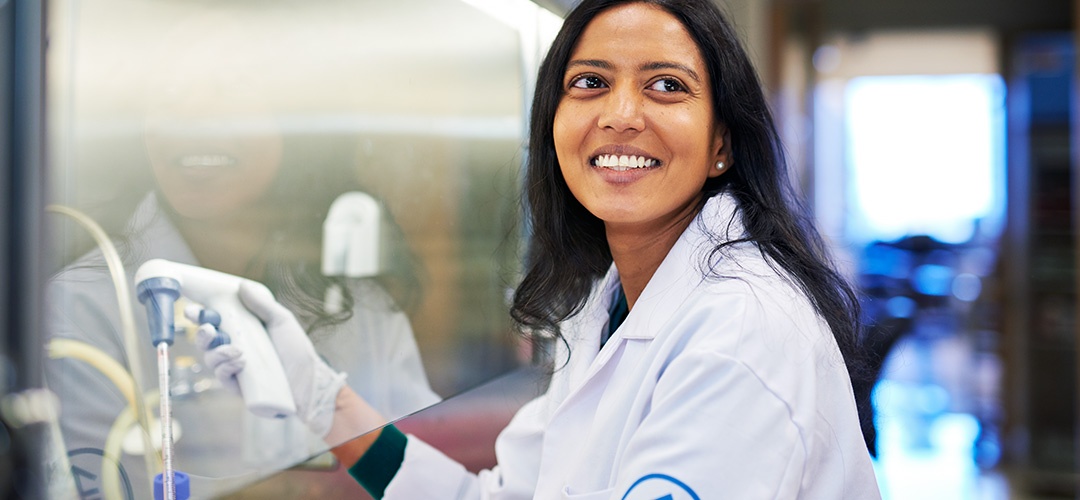An Investigation Into Metastasis
Q & A with Karuna Ganesh, MSK Physician-Scientist
Karuna Ganesh, MD, PhD, is an early-career physician-scientist at MSK. She takes care of people with colorectal cancer and studies metastasis, the spread of cancer that causes of 90% of cancer deaths. Dr. Ganesh recently discovered an aspect of metastasis that may lead to treatments that halt it — and save lives. She has been generously supported by MSK donors from the start – for example, she received numerous grants from the philanthropically funded Alan and Sandra Gerry Metastasis and Ecosystems Center at MSK and was selected to be a 2019 Josie Robertson Investigator, an honor that comes with a significant grant.
What role has philanthropic funding played in your life?
A continuing one. I attended a philanthropically funded high school in New Mexico: 200 kids from 80 countries, all on scholarships. At MSK, donor support paid for my fellowship, provided my lab with start-up funds, and now supports my investigations.
You are a scientist and a clinical oncologist — why both?
I chose to study cancer because it is essentially life gone wrong, when abnormal cells divide and proliferate uncontrollably. During my training, I also fell in love with being there for patients as they go through a life-altering journey. As a physician, it gives you a real sense of mission in your lab work.
Why did you choose a career at MSK?
During medical school, I did a rotation on the Lymphoma Service here. I was struck by how closely integrated the science and medicine are, as well as the sense of urgency. I returned as a fellow because I felt I could become the kind of physician-scientist I wanted to be at MSK.
What drew you to focus on metastasis?
It is the most pressing clinical problem in oncology. It’s why for the research portion of my fellowship I elected to work in the lab of Dr. Joan Massagué, Marie-Josée and Henry R. Kravis Chair, at the Alan and Sandra Gerry Metastasis and Tumor Ecosystems Center, an internationally renowned center of metastasis studies.
You led a breakthrough study on L1CAM that was published earlier in 2020. What did you learn?
We are trying to understand what makes metastatic cells different and more aggressive than primary cancers. We focused on the protein L1CAM, which is important for metastatic cancer cells’ ability to form new tumors in distant organs. During metastasis, cancer cells must let go of their neighbors to travel to distant organs. We found that this process activates a normal wound-healing program, which includes L1CAM.
What technology did you use?
I established a program to use patients’ metastatic colon cancer cells and grow them in the lab as three-dimensional organoids, which are miniaturized versions of tumors that behave like the real thing. By simply separating the organoid’s cells from one another, we were able to trigger L1CAM production, mimicking what we see in metastatic cancer — and determining the molecular signals that switch on the L1CAM-dependent wound-healing program in metastasis.
How could this research help patients?
Now that we know that metastasis is wound healing gone wrong, we are looking for drugs that may block L1CAM and rob cancer cells of their ability to metastasize.
Why is philanthropy so important to your work?
Donor support is essential for young investigators like me. We don’t have the long track records needed for federal grants, and yet we are often at our creative peaks in exploring new directions, which can sometimes reap great dividends for patients.
